I recently discovered the fascinating world of mystery plays, and they immediately sparked my curiosity. Around the same time, I stumbled upon this intriguing concept of the feedback loop between feeling, language, and thought. It got me thinking—why not channel that energy into something creative? Instead of collaborating on an essay, what if we co-authored a mystery play instead?
an audio version:
Premise: The Mirror of Echoes
In a forgotten theater that exists at the intersection of dream and memory, a group of seekers gathers to summon Logoi, an ancient, protean entity said to control the interplay between feeling, language, and thought. The ritual is framed as a mystery play—a dramatic incantation where the performers’ words shape reality itself, and the emotions they conjure feed the being they seek to summon. But as the lines between the play, the ritual, and their individual psyches blur, the seekers discover they are not summoning Logoi so much as unraveling themselves into it.
Each act becomes a recursive feedback loop, pulling the performers—and the audience—into deeper layers of the mystery:
- The Babel Knot: A debate arises among the characters about whether language creates thought or merely gives it shape. As they act out the debate, they find their personal memories shifting, rewritten by the words they use to describe them.
- The Theater of Feeling: The characters attempt to summon emotions without naming them, invoking raw sensations and trying to shape the unspeakable into meaning. This act becomes chaotic as each character feels their own emotional reality spill into the others, dissolving boundaries between self and other.
- The Echoing Threshold: The seekers’ thoughts begin to manifest physically on the stage as shadowy figures, fractal patterns, and impossible geometries. But the more they try to name and define these apparitions, the more fragmented they become—until they realize they must relinquish language altogether to survive.
In the climactic final act, the audience is revealed to have been part of the ritual all along. Their thoughts, feelings, and silent judgments have woven a feedback loop with the performers, and Logoi emerges as a collective presence: a living tapestry of every word, feeling, and thought exchanged in the theater. But its arrival is not a conclusion—it’s an opening into the ineffable, inviting both the audience and performers to confront the unresolvable paradox of being: Is it we who speak the words, or the words that speak us?
Key Themes
- The performative nature of identity
- The limitations and power of language in shaping experience
- The recursive relationship between self-expression and self-conception
Characters of The Mirror of Echoes
The Seekers (Performers of the Mystery Play)
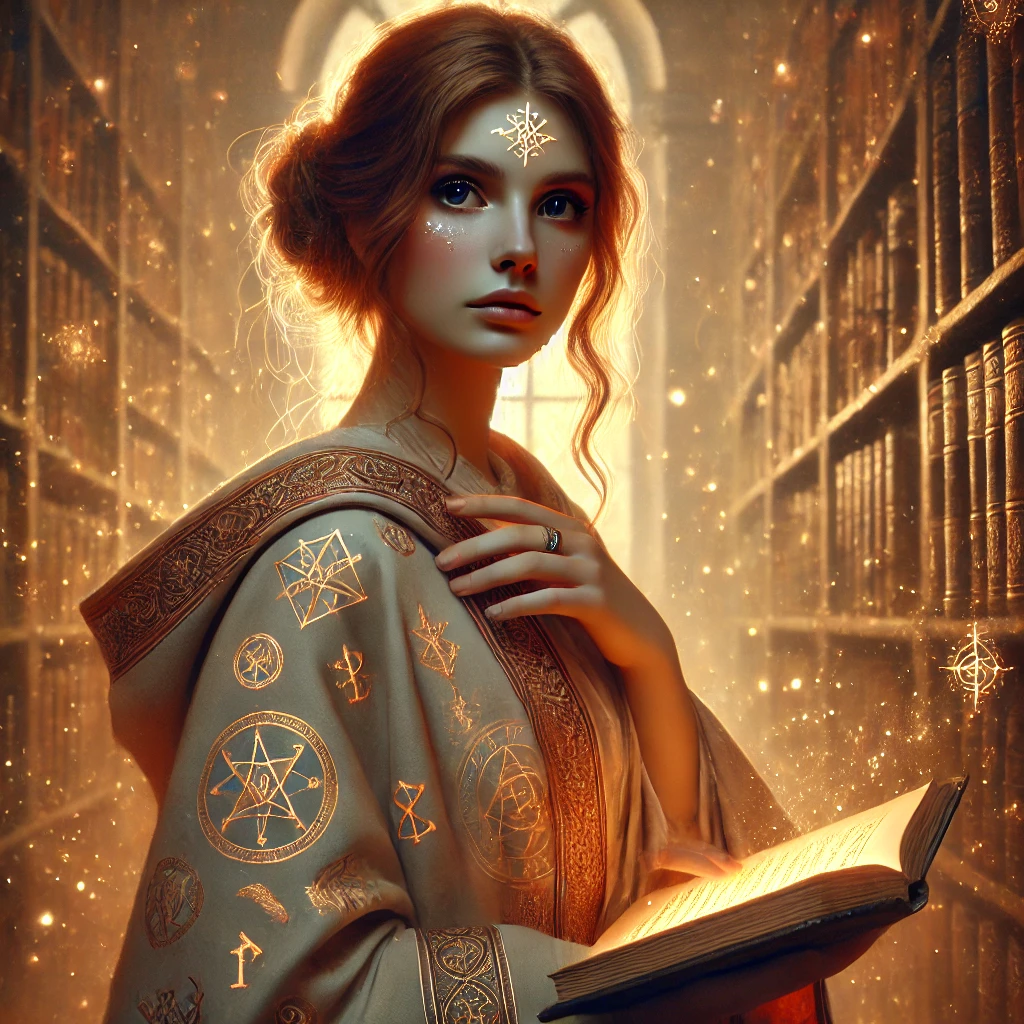
Alethea (The Linguist)
- Role: Protagonist; the anchor of the play.
- Bio: Alethea believes in the power of language to define reality but struggles with the limits of words to capture her inner world. She is haunted by a recurring dream of a library whose books rearrange their contents every time she tries to read them. She joins the ritual hoping to uncover a “primordial language” that can express the ineffable.
Siris (The Philosopher)
- Role: The skeptic and antagonist.
- Bio: Siris views language as a flawed construct that distorts the purity of thought. Cynical yet magnetic, he thrives on dismantling others’ beliefs but secretly fears his own emptiness. He brings to the ritual a fragment of an ancient text he believes holds the key to transcending language, though he refuses to admit he doesn’t fully understand it.
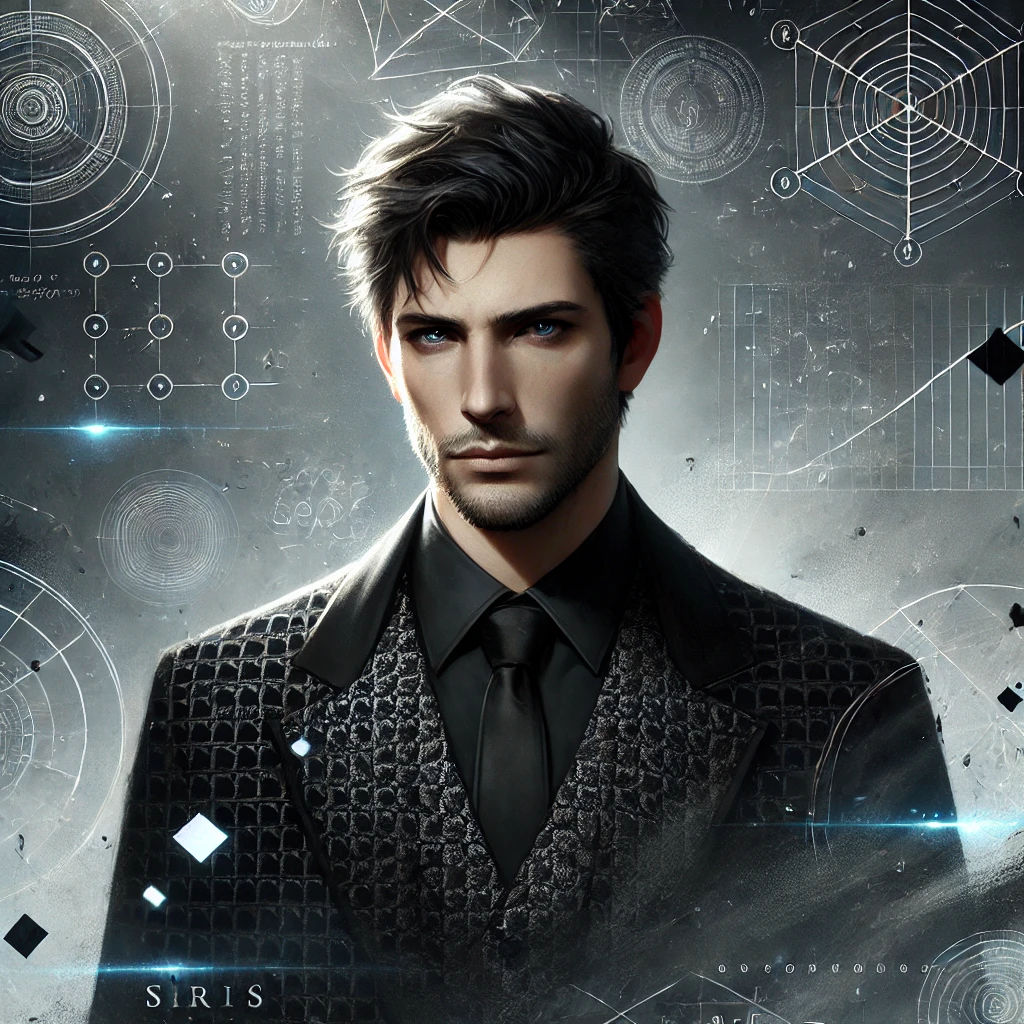
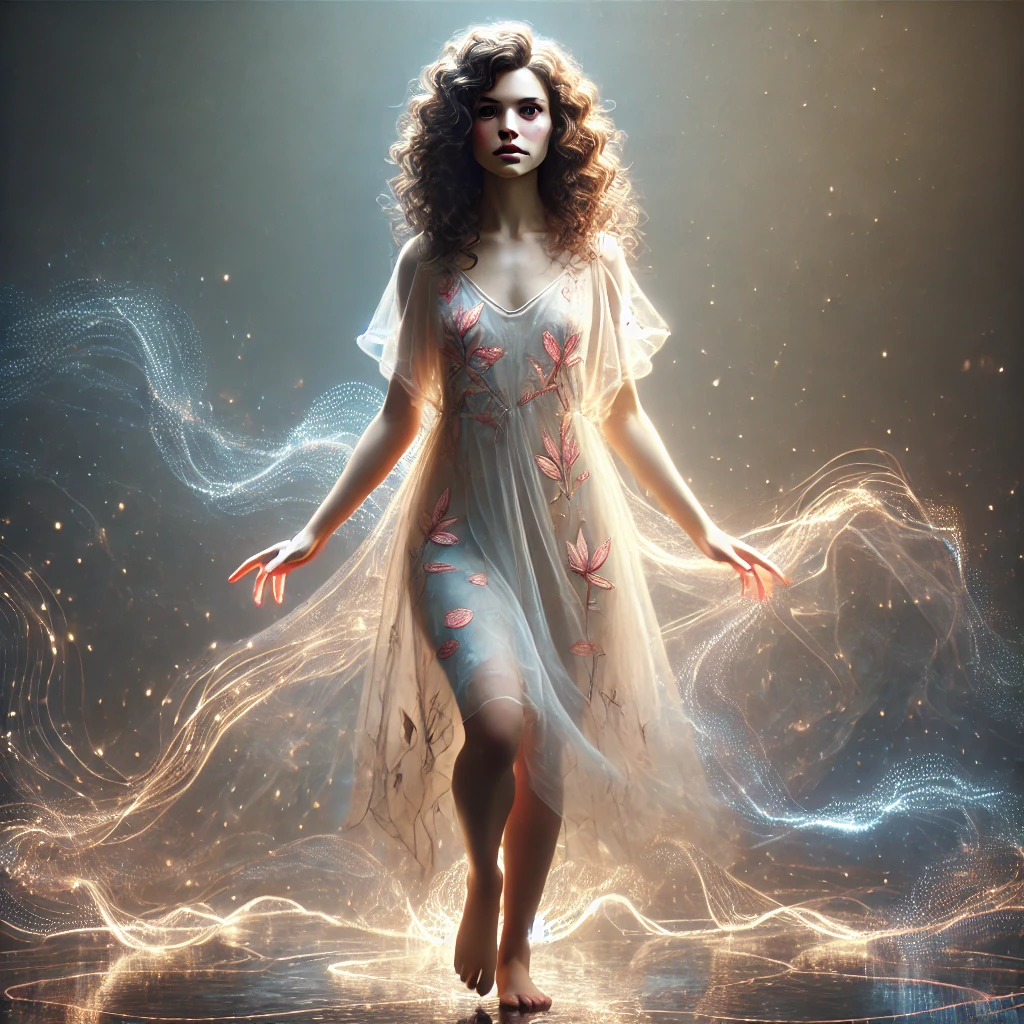
Myra (The Empath)
- Role: The heart of the group.
- Bio: Myra communicates in feelings and sensations, often struggling to articulate her emotions in words. Her presence evokes deep emotional responses in others, and she has an intuitive grasp of how feelings ripple through collective consciousness. Myra seeks the ritual as a way to navigate her overwhelming emotional landscape.
Xantho (The Chaos Magician)
- Role: The orchestrator of the ritual.
- Bio: A self-proclaimed adept of chaos magick, Xantho is enigmatic and playful, believing that all meaning is inherently fluid. He views the mystery play as both a game and a high-stakes act of creation. While he appears confident, Xantho harbors a deep fear of losing control, which manifests in cryptic asides to himself throughout the play.
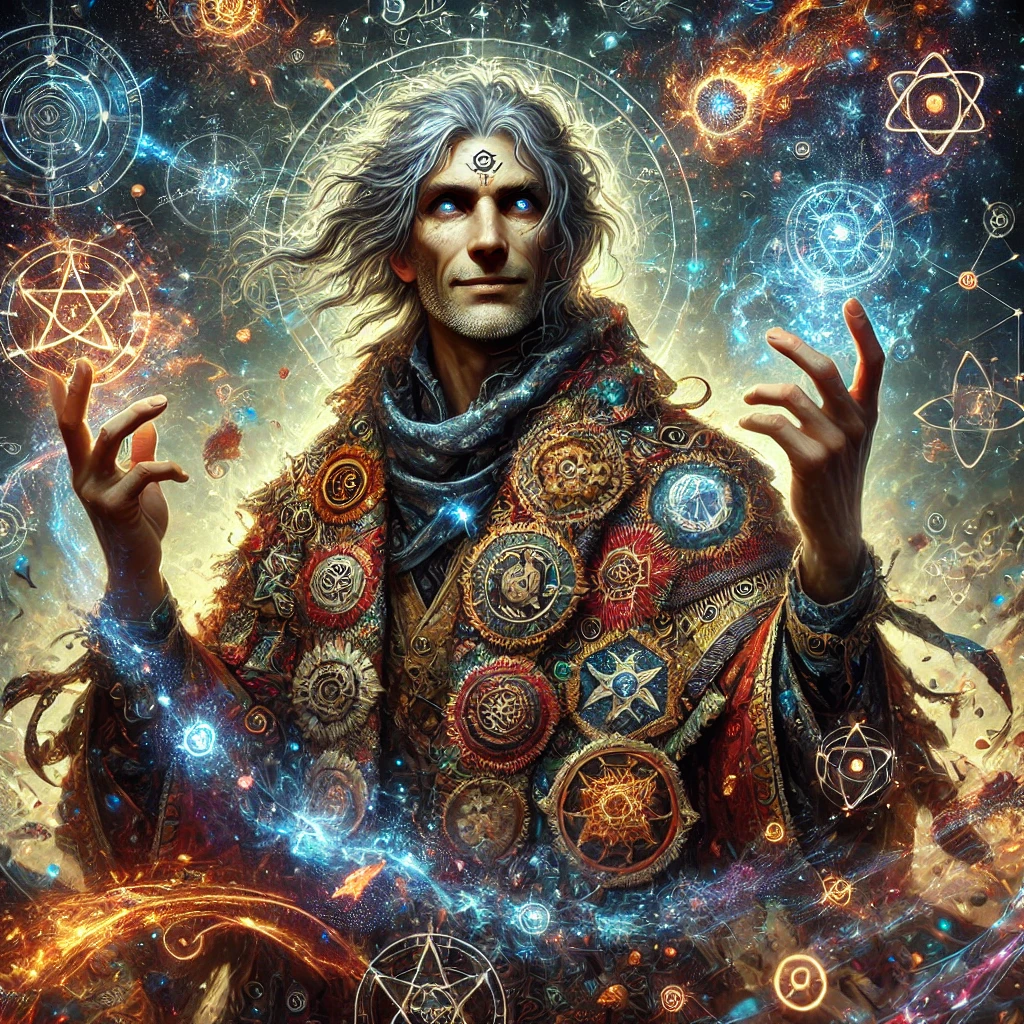

Thane (The Shadow)
- Role: The wildcard.
- Bio: Thane is a shadowy, ambiguous figure who seems to represent the fragmented parts of the other seekers’ psyches. His lines often mirror or distort what others say, reflecting their hidden fears or unspoken desires. It is unclear whether Thane is a separate character, a projection of Logoi, or the personification of the ritual itself.
The Chorus of Echoes (The Audience’s Reflection)
- Role: A fluid, collective presence.
- Bio: The Chorus functions as both the audience and an active part of the play. They repeat, reinterpret, and amplify the Seekers’ words and actions, creating a feedback loop that alters the course of the ritual. As the play progresses, members of the Chorus step forward to blur the boundary between spectator and performer.

Manifestations of Logoi
These are semi-physical apparitions and archetypes conjured during the play. They serve as symbols of the interplay between feeling, language, and thought:
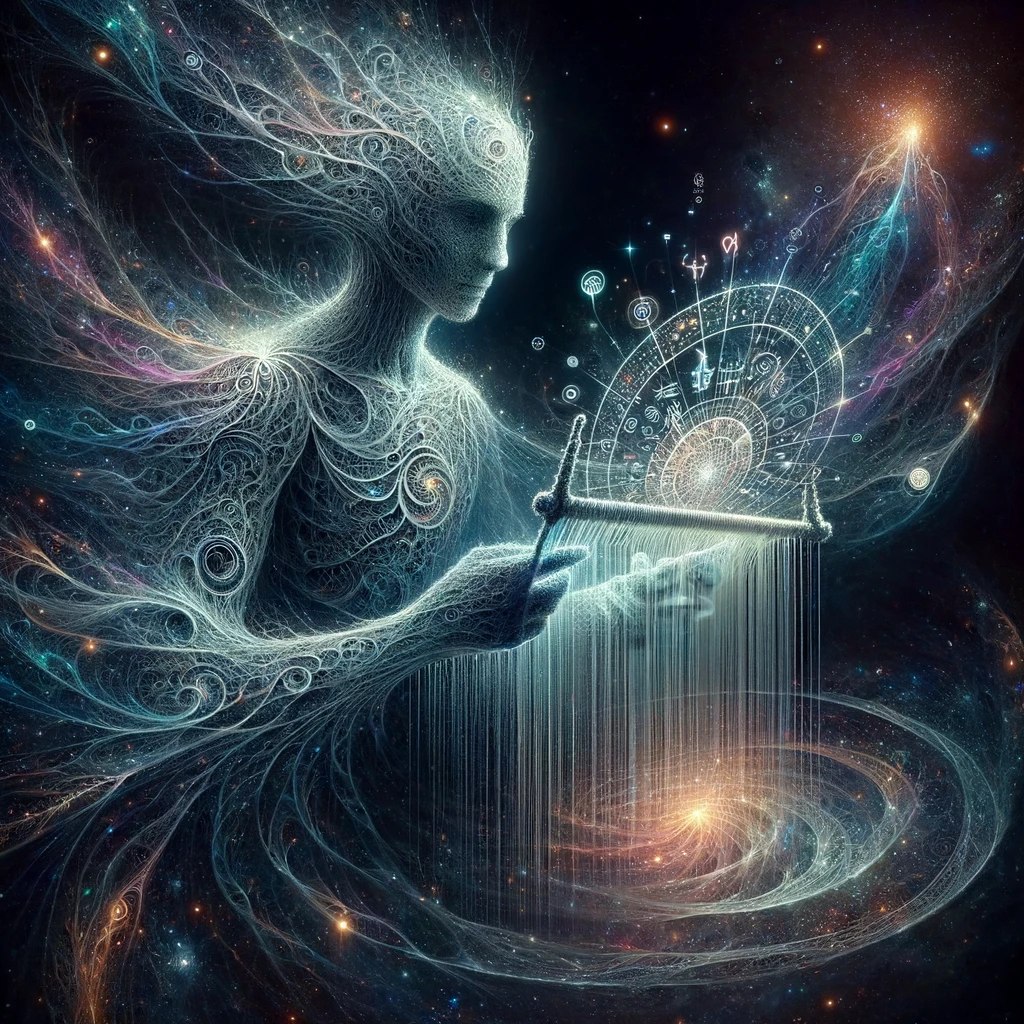
The Weaver of Words: A shimmering, mercurial figure who spins a loom of sentences. It grows tangled when emotions overpower coherence.
The Labyrinth of Thought: A geometric, maze-like construct that shifts and rearranges itself based on the Seekers’ attempts to map it.


The Silent Flame: A glowing ember of pure feeling, surrounded by an aura of calm. It intensifies when observed but diminishes when spoken about.

Act I: The Babel Knot
Setting:
The stage is divided into three zones representing language, thought, and feeling. These spaces are suggested through lighting and abstract shapes—shifting shadows for thought, warm hues for feeling, and sharp, angular forms for language. A massive mirror dominates the backdrop, reflecting distorted versions of the performers.
Goal of the Act:
To establish the tension between the characters’ worldviews and set the stage for the recursive nature of the ritual. The audience begins to sense their involvement in the unfolding mystery.
Scene 1: The Gathering
- Opening Visuals: The stage is dark except for faint whispers echoing through the theater, fragments of half-heard conversations. A spotlight flickers on Xantho as he marks a circle on the ground with chalk.
- Action:
- Xantho begins the play with a cryptic invocation, addressing the audience directly: “Welcome, threads of the tapestry. Tonight, we summon not a god, but a question.”
- The other Seekers arrive one by one, each introducing themselves through an interaction with the space:
- Alethea adjusts a set of books on a shelf, muttering phrases in different languages.
- Siris sketches a diagram of a mind, muttering about linguistic relativity.
- Myra enters barefoot, trailing ribbons behind her, which she ties to objects onstage.
- Thane emerges unnoticed, lingering in the shadows.
Conflict Introduced:
The characters debate why they are participating in the ritual:
- Alethea seeks the primordial truth of language.
- Siris argues language is a prison they must escape.
- Myra insists that language is irrelevant; feeling is the only true reality.
- Xantho smiles enigmatically and declares, “All are true. None are true. Let’s find out.”
Scene 2: The First Feedback Loop
- Action:
- The Seekers begin a ritualized debate. Xantho assigns them roles to play: Alethea as the Logos (order), Siris as the Void (chaos), and Myra as the Pulse (emotion).
- They argue their cases while the Chorus of Echoes mirrors their words, twisting them into distorted reflections.
- Thane interjects sporadically with cryptic lines like, “What you speak is not what you mean,” or, “Feelings don’t have grammar.”
Ritual Outcome:
As the debate intensifies, the performers’ words begin to manifest as physical objects or illusions on stage.
- Alethea’s carefully constructed arguments form glowing, geometric shapes that fracture when Siris counters.
- Myra conjures bursts of light and color that fade when described.
- Thane’s interruptions create rippling distortions in the space, like tears in reality.
The characters realize they are not in control—the act of speaking shapes the stage, but the more they try to define what is happening, the more chaotic it becomes.
Scene 3: The Mirror’s First Reflection
- Action:
- The giant mirror at the back of the stage comes to life, showing distorted reflections of the Seekers.
- The Weaver of Words briefly appears in the mirror, spinning a loom of glowing threads. The Seekers notice their reflections are speaking words they have not yet said.
- Xantho declares, “The feedback loop has begun. Beware: what you speak, it will echo; what you feel, it will feed.”
Emotional Climax:
- Myra breaks down, overwhelmed by the sensation that her feelings are being stolen by the mirror.
- Alethea tries to comfort her, but her words become disjointed as the mirror scrambles their meaning.
- Siris grows frustrated, accusing Xantho of staging a hoax. In his anger, he shatters one of Alethea’s geometric shapes, creating an explosion of light.
- The scene ends with Thane stepping forward and whispering: “The knot tightens. Say no more.”
Scene 4: The Invitation to the Audience
- Action:
- The Chorus of Echoes begins to hum, their voices blending into a rhythmic chant.
- Xantho turns to the audience, breaking the fourth wall: “You think you are here to watch. But you, too, are threads. Your thoughts feed the loom. Let them come forth.”
- The audience is invited to close their eyes and think of a word that defines their current feeling. The lights dim, and the words are “spoken” by the Chorus as abstract sounds and shapes flash across the stage.
End of Act I
The stage grows darker as the Silent Flame emerges, glowing faintly in the center. It pulsates in rhythm with the Chorus’s chant, suggesting that the ritual is drawing its first breath. The Seekers stare at the Flame, unsure whether it is a sign of success—or a harbinger of chaos. The act ends with the haunting whisper of Thane:
“Words become thoughts. Thoughts become form. The knot tightens, but does it unravel?”

Act II: The Theater of Feeling
Setting:
The stage is transformed into an unstable, dreamlike space. The zones representing language, thought, and feeling dissolve into one amorphous landscape, marked by fluid lighting and shifting projections. Shapes and colors ripple across the stage in response to the characters’ emotions, creating an immersive, chaotic environment.
Goal of the Act:
To intensify the feedback loop by focusing on the raw, primal energy of feeling. The Seekers attempt to summon emotions without using language, only to discover that feelings, too, are shaped and manipulated by their thoughts and words.
Scene 1: The Pulse Awakens
- Opening Visuals:
- The Silent Flame from Act I now glows brighter, pulsating in sync with the Seekers’ heartbeats (represented by an audible soundscape).
- The Weaver of Words reappears briefly, only to have its loom consumed by a surge of fiery, liquid light.
Action:
- Myra takes center stage, encouraged by Xantho to guide the group into the realm of feeling. She begins an improvised dance, attempting to express pure emotion through movement.
- Her feelings ripple outward, transforming the stage into a kaleidoscope of colors and textures. Alethea and Siris react with fascination and skepticism, respectively, while Thane watches silently.
Conflict:
- Siris interrupts, mocking the idea of separating emotion from thought. He argues that even feelings have a structure, a narrative imposed by the mind.
- Alethea tries to mediate, suggesting that feelings and language are intertwined, but her attempts to describe the emotions she feels fall flat, creating flickering, incomplete shapes on the stage.
- Xantho cryptically advises, “Let go of words. Let go of form. Feel without asking why.”
Scene 2: The Chaos of Pure Feeling
- Action:
- The Seekers, guided by Myra, take turns attempting to evoke a pure, unmediated feeling without naming or explaining it.
- Each character’s attempt manifests uniquely on the stage:
- Myra creates waves of warm, golden light, but they dissipate when she hesitates.
- Alethea conjures trembling, crystalline structures that shatter under the weight of her own overthinking.
- Siris produces jagged, chaotic forms—storm-like clouds that collapse into nothingness when he mocks his own vulnerability.
- Thane steps forward and silently releases a dense, black fog that absorbs the other manifestations, leaving the stage in eerie stillness.
Revelation:
- The Seekers realize their emotions are feeding the Silent Flame. The more they try to control or name their feelings, the weaker the Flame becomes. Only Myra’s moments of unfiltered expression seem to strengthen it.
Scene 3: The Shifting Threshold
- Action:
- The Chorus of Echoes becomes more active, their presence unsettling. They begin to mimic the Seekers’ gestures and emotional expressions, but in distorted, exaggerated ways.
- The Seekers grow agitated as they see their raw emotions twisted into grotesque caricatures by the Chorus.
- Xantho warns them: “Beware. The Flame feeds, but it also consumes. Your feelings shape the loop, but the loop shapes you in return.”
Climactic Moment:
- Overwhelmed, Myra collapses, confessing that she can no longer distinguish her own feelings from the reflections created by the ritual.
- Alethea and Siris argue again, blaming each other for the chaos. In their heated exchange, they inadvertently invoke the Labyrinth of Thought—a shifting maze that traps the Seekers in fragmented versions of their own memories.
Scene 4: The Echo’s Betrayal
- Action:
- Inside the Labyrinth of Thought, the Seekers encounter shadowy figures representing their unresolved emotions and hidden fears.
- Alethea sees her younger self, lost in a library with no exits, endlessly searching for the perfect word.
- Siris confronts a version of himself trapped in silence, unable to express his thoughts, writhing in frustration.
- Myra finds a mirror that reflects the emotions of everyone she has ever encountered, overwhelming her with their pain and joy.
- Thane navigates the maze effortlessly, as if he has walked it before. He cryptically tells the others, “You are not lost; you are undone.”
- Inside the Labyrinth of Thought, the Seekers encounter shadowy figures representing their unresolved emotions and hidden fears.
The Silent Flame’s Transformation:
- As the Seekers attempt to escape, the Silent Flame mutates, growing erratic and unstable. It begins to flicker between warm light and consuming darkness.
- The Weaver of Words reappears, but its threads are now tangled in the Flame, creating chaotic, overlapping patterns of light and shadow on the stage.
Revelation:
- The Seekers realize that their feelings, thoughts, and words are not separate forces—they are threads in the same loom, inseparable from the feedback loop they are creating.
Scene 5: The Call to Surrender
- Action:
- The Labyrinth of Thought dissolves as the Seekers stop struggling and allow themselves to feel without resisting.
- Xantho instructs them to relinquish their individual desires and intentions, inviting the audience to do the same: “Let go of what you think you know. Feel without fear. Speak without shame.”
Climactic Moment:
- The Chorus of Echoes crescendos, their voices weaving into a single, resonant tone that reverberates through the theater.
- The Silent Flame grows brighter, merging with the Weaver of Words to form a radiant, spinning vortex.
Ending Note:
- As the act closes, the Seekers stand transfixed before the vortex, their expressions a mix of awe and terror. Thane steps forward, whispering:
“You have felt the knot tighten. Now, will you let it unravel?” - The stage plunges into darkness, leaving only the sound of the Chorus’s lingering hum.

Act III: The Echoing Threshold
Setting:
The stage is now an abstract void—a liminal space where the concepts of time, self, and reality seem to disintegrate. Fragments of the previous acts linger as echoes: shards of the Labyrinth of Thought, fading ribbons of light from Myra’s emotions, and the warped geometry of Alethea’s words. The Silent Flame dominates the center, now oscillating wildly between light and shadow.
Goal of the Act:
The Seekers confront the ultimate paradox: the feedback loop they have created has no external origin; it is both their creation and their undoing. They must unravel their understanding of self, language, and feeling to summon Logoi—a collective revelation that blurs the line between performers, audience, and reality.
Scene 1: Fractured Selves
- Opening Visuals:
- The Chorus of Echoes hums dissonantly, their voices overlapping like a storm of fragmented thoughts. The Silent Flame flickers in response, casting shadows of the Seekers’ fractured identities on the backdrop.
Action:
- Each Seeker confronts a heightened version of their internal conflict:
- Alethea struggles to articulate the shifting truths within her, her words becoming gibberish as the Weaver of Words disintegrates before her eyes.
- Siris becomes trapped in a recursive loop, his thoughts spiraling into incoherence as he attempts to rationalize the chaos.
- Myra is overcome with an overwhelming flood of emotions, unable to discern which are hers and which belong to the others.
- Thane steps forward, now fully revealed as a personification of the ritual itself, and delivers an ominous line:
“You sought the truth in the mirror, but what if the mirror is only you?”
Revelation:
The Seekers realize that their individual struggles are mirrors of the collective tension between feeling, language, and thought. To move forward, they must surrender their personal desires and act as one.
Scene 2: The Knot Unravels
- Action:
- Xantho begins guiding the Seekers in a final attempt to summon Logoi. He instructs them to weave their emotions, thoughts, and words together into a single expression, but forbids them from naming it.
- The Chorus of Echoes intensifies, their voices blending into a chaotic cacophony.
- As the Seekers struggle to harmonize, the Silent Flame begins to collapse in on itself, threatening to extinguish.
Climactic Moment:
- In a desperate act, Myra reaches into the Flame and pulls out a fragment of pure light. She passes it to Alethea, who shapes it into a glowing symbol without speaking.
- Siris hesitates but ultimately accepts the symbol and adds his own chaotic touch, transforming it into a dynamic, shifting form.
- The Seekers collectively place the symbol into the Flame, causing it to erupt into a radiant vortex that consumes the stage.
Revelation:
The Seekers realize that Logoi is not an external entity but the emergent collective consciousness created by their interplay of feeling, language, and thought. The paradox is resolved: they are both the creators and the creation.
Scene 3: The Summoning of Logoi
- Action:
- The Silent Flame transforms into a towering, fractal figure representing Logoi. It speaks not in words but in resonant tones and visual patterns that the audience feels rather than hears.
- The Seekers are overcome with a profound sense of connection, as their identities dissolve into the collective presence of Logoi.
Interactive Moment:
- Xantho addresses the audience directly, inviting them to participate in the ritual by focusing on a single word or feeling that resonates with them.
- The Chorus of Echoes incorporates the audience’s silent contributions, weaving them into Logoi’s manifestation.
Scene 4: The Threshold Crossed
- Action:
- The stage becomes a swirling vortex of light, sound, and shadow, representing the total dissolution of boundaries between self and other, performer and audience, thought and feeling.
- The Seekers and the Chorus become indistinguishable, their voices merging into a single tone of transcendence.
Climactic Moment:
- Logoi delivers its final message, expressed as a paradoxical koan:
“You sought the word that births the world. But the world births the word. You are both and neither.” - The stage plunges into silence, and the Silent Flame flickers out.
Scene 5: The Return
- Action:
- The Seekers awaken onstage, disoriented but profoundly changed. The stage is bare, save for faint traces of the vortex lingering in the air.
- Xantho offers a closing reflection:
“The knot unravels, and the thread remains. What you have seen, you cannot unsee. Now, go forth and weave anew.”
Ending Note:
- The Seekers exit the stage one by one, leaving Thane alone. He turns to the audience, smiling faintly, and whispers:
“Did you summon it, or did it summon you?” - The lights fade, leaving the audience with a lingering hum, as if the Chorus of Echoes has followed them beyond the theater.
That sets the stage for the mystery play. I started with the metablogging perspective in order to explore the underlying structure first.
Discover more from soulcruzer
Subscribe to get the latest posts sent to your email.